For the 2025 school year, there is 1 public middle school serving 461 students in Wright Elementary School District. This district's average middle testing ranking is 5/10, which is in the bottom 50% of public middle schools in California.
Public Middle School in Wright Elementary School District have an average math proficiency score of 22% (versus the California public middle school average of 31%), and reading proficiency score of 46% (versus the 46% statewide average).
Minority enrollment is 82% of the student body (majority Hispanic), which is more than the California public middle school average of 78% (majority Hispanic).
Overview
This School District
This State (CA)
# Schools
3 Schools
3,501 Schools
# Students
1,259 Students
1,854,363 Students
# Teachers
55 Teachers
87,821 Teachers
Student : Teacher Ratio
23:1
23:1
District Rank
Wright Elementary School District, which is ranked #769 of all 1,925 school districts in California (based off of combined math and reading proficiency testing data) for the 2021-2022 school year.
Overall District Rank
#750 out of 1941 school districts
(Top 50%)
(Top 50%)
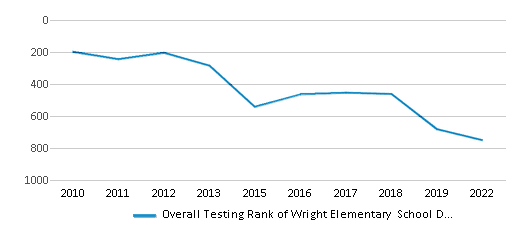
Math Test Scores (% Proficient)
30%
33%
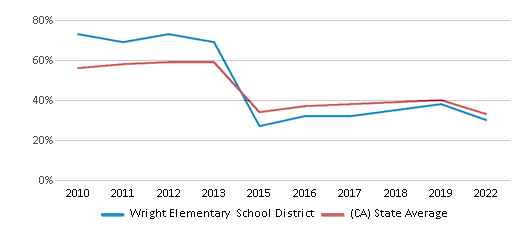
Reading/Language Arts Test Scores (% Proficient)
49%
47%
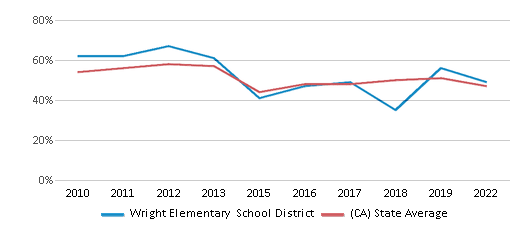
Science Test Scores (% Proficient)
24%
29%
Students by Ethnicity:
Diversity Score
0.53
0.64
# American Indian Students
10 Students
9,887 Students
% American Indian Students
1%
1%
# Asian Students
105 Students
201,760 Students
% Asian Students
8%
11%
# Hispanic Students
833 Students
1,009,980 Students
% Hispanic Students
66%
55%
# Black Students
35 Students
97,908 Students
% Black Students
3%
5%
# White Students
189 Students
413,325 Students
% White Students
15%
22%
# Hawaiian Students
7 Students
7,600 Students
% Hawaiian Students
1%
n/a
# Two or more races Students
77 Students
109,003 Students
% of Two or more races Students
6%
6%
Students by Grade:
# Students in PK Grade:
-
83
# Students in K Grade:
220
90,358
# Students in 1st Grade:
150
70,728
# Students in 2nd Grade:
162
73,359
# Students in 3rd Grade:
135
73,090
# Students in 4th Grade:
167
76,068
# Students in 5th Grade:
173
82,191
# Students in 6th Grade:
150
289,122
# Students in 7th Grade:
48
439,549
# Students in 8th Grade:
54
441,705
# Students in 9th Grade:
-
59,696
# Students in 10th Grade:
-
51,846
# Students in 11th Grade:
-
51,149
# Students in 12th Grade:
-
55,419
# Ungraded Students:
-
-
District Revenue and Spending
The revenue/student of $17,705 in this school district is less than the state median of $19,974. The school district revenue/student has stayed relatively flat over four school years.
The school district's spending/student of $16,428 is less than the state median of $18,396. The school district spending/student has stayed relatively flat over four school years.
Total Revenue
$22 MM
$116,387 MM
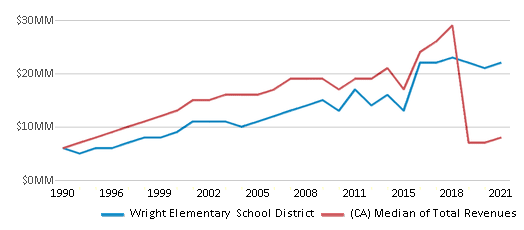
Spending
$21 MM
$107,188 MM
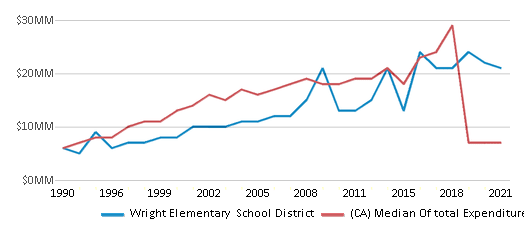
Revenue / Student
$17,705
$19,974
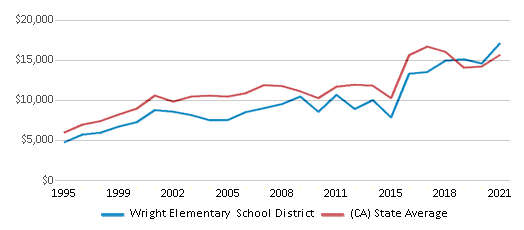
Spending / Student
$16,428
$18,396
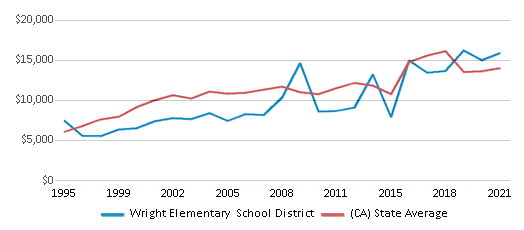
Best Wright Elementary School District Public Middle Schools (2025)
School
(Math and Reading Proficiency)
(Math and Reading Proficiency)
Location
Grades
Students
Rank: #11.
Wright Charter
Charter School
(Math: 22% | Reading: 46%)
Rank:
Rank:
5/
Bottom 50%10
4389 Price Ave.
Santa Rosa, CA 95407
(707) 542-0556
Santa Rosa, CA 95407
(707) 542-0556
Grades: K-8
| 461 students
Recent Articles

Year-Round Or Traditional Schedule?
Which is more appropriate for your child? A year-round attendance schedule or traditional schedule? We look at the pros and cons.

Why You Should Encourage Your Child to Join a Sports Team
Participating in team sports has a great many benefits for children, there is no doubt. In this article you will learn what those benefits are.

White Students are Now the Minority in U.S. Public Schools
Increasing birth rates among immigrant families from Asia and Central and South America, combined with lower birth rates among white families, means that for the first time in history, public school students in the United States are majority-minority. This shift in demographics poses difficulties for schools as they work to accommodate children of varying language abilities and socio-economic backgrounds.





